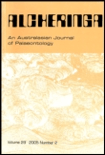
ALCHERINGA
Scope & Guideline
Unraveling the Mysteries of Life Through Research
Introduction
Aims and Scopes
- Palaeobiology and Evolutionary Studies:
Research on the evolutionary history of organisms, including taxonomic revisions, phylogenetic relationships, and the implications of fossil discoveries for understanding evolution. - Palaeoecology and Environmental Reconstruction:
Studies that explore ancient ecosystems, including the interactions between organisms and their environments, based on fossil evidence. - Biostratigraphy and Chronostratigraphy:
Research focused on the chronological arrangement of fossils and rock layers, contributing to the understanding of geological time scales and the distribution of species over time. - Fossil Taxonomy and Systematics:
Detailed descriptions and classifications of new and existing fossil taxa, enhancing the understanding of biodiversity and the relationships among extinct species. - Geological Context of Fossils:
Investigations into the geological settings of fossil finds, including sedimentology and stratigraphy, to provide context for the conditions under which these organisms lived.
Trending and Emerging
- Climate Change Impacts on Fossil Records:
A growing interest in how past climate changes are recorded in the fossil record, providing insights into the responses of ecosystems to environmental shifts. - Technological Advances in Fossil Analysis:
The adoption of new technologies, such as micro-CT imaging and advanced imaging techniques, is increasing, allowing for more detailed examinations of fossils and their contexts. - Interdisciplinary Approaches to Palaeontology:
An emerging trend of integrating palaeontology with other scientific disciplines, such as genetics and ecology, to provide a more holistic understanding of ancient life. - Conservation Paleobiology:
Research focusing on the implications of fossil findings for modern conservation efforts is gaining traction, emphasizing the relevance of palaeontological insights for contemporary biodiversity issues.
Declining or Waning
- Micropalaeontology:
Research in micropalaeontology, particularly concerning smaller fossilized organisms, has seen a decrease, possibly due to a shift towards more comprehensive studies of macrofossils and their ecological implications. - Paleoanthropology:
The focus on human evolution and fossil hominids has diminished, likely as the field becomes more specialized and researchers concentrate on specific aspects of human ancestry rather than broad surveys. - Palaeobiogeography:
Studies examining the geographic distribution of fossils over time have become less frequent, possibly due to an increased emphasis on localised case studies rather than broad geographical analyses.
Similar Journals
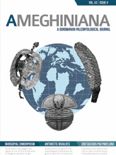
AMEGHINIANA
Elevating Understanding of Ecological Interactions and EvolutionAMEGHINIANA is a distinguished academic journal published by the ASOCIACION PALEONTOLOGICA ARGENTINA, serving as a vital platform for the dissemination of cutting-edge research in the fields of Ecology, Evolution, Behavior and Systematics, as well as Paleontology. With its ISSN 0002-7014 and E-ISSN 1851-8044, the journal has established itself as a key reference point for scholars seeking to explore the intricate relationships within ecological systems and the evolutionary history of species. Despite not offering open access, AMEGHINIANA maintains a reputation bolstered by a Q3 ranking in both its subject categories, underlining its sustained commitment to enhancing scientific knowledge. Researchers and professionals alike benefit from this journal’s extensive archive of studies dating back to 1985, with ongoing contributions expected until 2024. With a focus on high-quality content, this journal is essential for anyone immersed in the study of paleobiology and ecological systems.

REVISTA BRASILEIRA DE PALEONTOLOGIA
Championing Innovative Methodologies in PaleontologyREVISTA BRASILEIRA DE PALEONTOLOGIA (ISSN: 1519-7530, E-ISSN: 2236-1715) is a premier academic journal dedicated to the field of paleontology, published by the esteemed SOCIEDADE BRASILEIRA DE PALEONTOLOGIA. Operating under a Q3 quartile ranking in the 2023 Scopus statistics for Paleontology, this journal serves as a vital platform for researchers, professionals, and students to disseminate and engage with cutting-edge discoveries and methodologies in paleontological studies. With a broad scope that encompasses various aspects of Earth's historical life, REVISTA BRASILEIRA DE PALEONTOLOGIA provides an essential resource for the scientific community, particularly those based in Brazil and South America. The journal is committed to promoting rigorous research and fostering collaboration among scholars, ultimately contributing to advancements in the understanding of past biodiversity and extinction events. Its thoughtful curation of articles since 2010 ensures that it remains at the forefront of paleontological scholarship, despite its limited HIndex and open access options. This journal is a crucial asset for anyone looking to deepen their understanding of evolutionary processes that have shaped our planet.
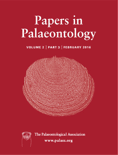
Papers in Palaeontology
Shaping the Future of Paleontological DiscoursePapers in Palaeontology, published by WILEY, is a premier academic journal dedicated to advancing the field of paleontology. With an admirable impact factor and positioned within the Q1 category in Paleontology for 2023, this journal has established itself as a leading platform for innovative research and discussion, ranking 17th out of 113 in Scopus’s Earth and Planetary Sciences category. Since its inception in 2015, Papers in Palaeontology has aimed to publish high-quality, peer-reviewed articles that explore the diversity of ancient life forms and their evolutionary history. Researchers, professionals, and students alike will find valuable insights and rigorous analyses that contribute to the understanding of our planet’s past. Although Open Access options are not available, the journal provides a wealth of knowledge essential for anyone engaged in the study or practice of paleontology, solidifying its importance in shaping future academic discourse.
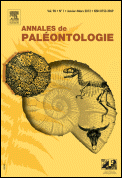
ANNALES DE PALEONTOLOGIE
Connecting Researchers to the Depths of TimeANNALES DE PALEONTOLOGIE is a distinguished academic journal published by MASSON EDITEUR that plays a pivotal role in the field of paleontology. With an ISSN of 0753-3969 and an E-ISSN of 1778-3666, this journal has been a vital resource since its inception in 1988, continuously contributing to the advancement of knowledge in Earth and Planetary Sciences, particularly focusing on paleontological research. Currently ranked #68 out of 113 in its category by Scopus, and celebrated for its Q2 quartile standing, ANNALES DE PALEONTOLOGIE publishes innovative studies, reviews, and discussions that appeal to a diverse audience of researchers, professionals, and students. The journal aims to foster a deeper understanding of paleontological phenomena and encourages interdisciplinary collaboration within the scientific community. Although it is not an open access journal, its commitment to scholarly excellence ensures that the content is highly regarded and widely referenced in academic circles. Situated in Issy-les-Moulineaux, France, it continues to maintain a global readership while promoting significant advancements in paleontological research.
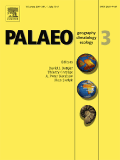
PALAEOGEOGRAPHY PALAEOCLIMATOLOGY PALAEOECOLOGY
Connecting Geological Records with Contemporary Ecological DynamicsPalaeogeography, Palaeoclimatology, Palaeoecology, published by Elsevier and accessible via ISSN 0031-0182 (print) and E-ISSN 1872-616X (online), stands as a pivotal journal in the fields of Earth-Surface Processes, Ecology, Evolution, Behavior and Systematics, Oceanography, and Paleontology. With an impressive Impact Factor and ranking in the top quartile (Q1) across multiple categories, this journal facilitates cutting-edge research that explores the intricate relationships between past climates, environments, and ecosystems. Its scope encompasses a wide array of studies focusing on the geological and biological records that inform our understanding of contemporary ecological dynamics. Key objectives include advancing knowledge in palaeoecology and enriching discourse around climate change through rigorous research contributions. The journal's dedicated commitment to publishing high-quality, peer-reviewed articles makes it an invaluable resource for researchers, professionals, and students alike, providing insights essential for probing the factors shaping our planet's history. Positioned in the Netherlands and continuing its tradition of excellence since 1965, the Palaeogeography, Palaeoclimatology, Palaeoecology journal remains at the forefront of interdisciplinary research that bridges the past and future.

PalZ
Unlocking the Mysteries of Evolutionary ChangePalZ is a prestigious academic journal in the field of Paleontology, published by Springer Heidelberg in Germany. With a long-standing history that traces back to its converged years from 1914 to 2024, this journal offers invaluable insights into the evolutionary dynamics and ecological relationships of past life forms. Holding a commendable impact factor and ranked in the Q2 category of Paleontology, it consistently showcases high-quality research that resonates within the scientific community, evidenced by its Scopus rank of #38 out of 113 in Earth and Planetary Sciences. PalZ is committed to open access, ensuring that its rich repository of scholarly articles is readily accessible for researchers, professionals, and students alike. By engaging with the journal, readers will encounter cutting-edge studies that are pivotal for advancing our understanding of paleobiology and the historical patterns of biodiversity.
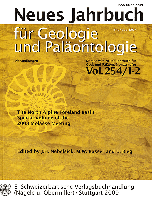
NEUES JAHRBUCH FUR GEOLOGIE UND PALAONTOLOGIE-ABHANDLUNGEN
Unlocking the Secrets of Earth’s EvolutionNEUES JAHRBUCH FUR GEOLOGIE UND PALAONTOLOGIE-ABHANDLUNGEN, published by E SCHWEIZERBARTSCHE VERLAGSBUCHHANDLUNG, is a distinguished scholarly journal based in Germany that has made significant contributions to the field of Earth and Planetary Sciences with a particular emphasis on Paleontology. With its ISSN: 0077-7749, this journal provides an essential platform for researchers, professionals, and students to explore cutting-edge research and developments that enhance our understanding of geological and paleontological processes. Boasting a robust ranking of #67 out of 113 in Scopus for the category of Earth and Planetary Sciences and achieving a Q3 quartile ranking in Paleontology, it stands as a significant resource in the global academic community. Though not an open-access journal, it offers valuable insights from 1987 onwards, ensuring a comprehensive archive of high-quality research articles published from 1995 to 2024. Its scholarly impact continues to resonate, making it a vital reference point for advancements in the ever-evolving disciplines of geology and paleontology.
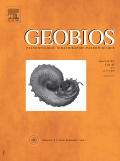
GEOBIOS
Fostering Innovation in Earth and Planetary ResearchGEOBIOS is a prominent academic journal published by Elsevier France-Editions Scientifiques Medicales Elsevier, specializing in the fields of Paleontology, Space and Planetary Science, and Stratigraphy. With a rich publication history dating back to 1966, the journal aims to foster scholarly communication and dissemination of significant research findings among professionals and researchers in earth sciences. Recognized for its impact within the scientific community, GEOBIOS holds a respectable Q2 ranking in several categories, positioning it within the top tiers of scientific journals. Despite its traditional publication format, the journal provides a platform for groundbreaking studies that influence our understanding of both the geological past and future planetary developments. The journal's consistent ranking, including Rank #36 in Paleontology and Rank #59 in Space and Planetary Science, underscores its relevance and significance in its field. GEOBIOS serves as an essential resource for those engaged in the exploration of earth's history and its extraterrestrial counterparts, making it invaluable to researchers, students, and professionals alike.
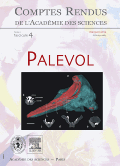
COMPTES RENDUS PALEVOL
Unearthing Earth's Secrets, One Article at a TimeCOMPTES RENDUS PALEVOL, published by ACAD SCIENCES in France, stands as a pivotal journal in the field of paleontology. With an ISSN of 1631-0683 and an E-ISSN of 1777-571X, this esteemed publication provides a platform for innovative research and scholarly discourse, contributing significantly to the understanding of Earth's biological history. Having achieved a commendable Q2 rank in the 2023 Paleontology category and positioned at Rank #63 out of 113 in the Scopus Earth and Planetary Sciences segment, it underscores its relevance and influence in the scientific community. The journal's converged years from 2002 to 2024 reflect a commitment to ongoing research and knowledge dissemination. Although currently lacking open access options, the journal's rigorous peer-review process ensures the integrity and quality of published articles, making it an essential resource for researchers, professionals, and students striving to explore and expand their expertise in paleontological sciences.

PALEONTOLOGICAL JOURNAL
Delving into Fossils, Discovering History.The PALEONTOLOGICAL JOURNAL, published by PLEIADES PUBLISHING INC, is a premier platform for the dissemination of research in the field of paleontology. With an ISSN of 0031-0301 and E-ISSN 1555-6174, this journal serves the academic community by providing insights into fossil studies, evolutionary biology, and the historical narrative of life on Earth. Despite being categorized in the Q3 quartile for 2023 and currently holding a Scopus rank of #84 out of 113 in the Earth and Planetary Sciences- Paleontology category, it remains a valuable resource for researchers and practitioners. The journal's coverage spans from 1990 to 2024, offering a comprehensive historical perspective while also addressing contemporary issues in paleological research. Scholars and students alike benefit from its rigorous peer-reviewed articles and the opportunity to access vital knowledge in the ever-evolving field of paleontology.